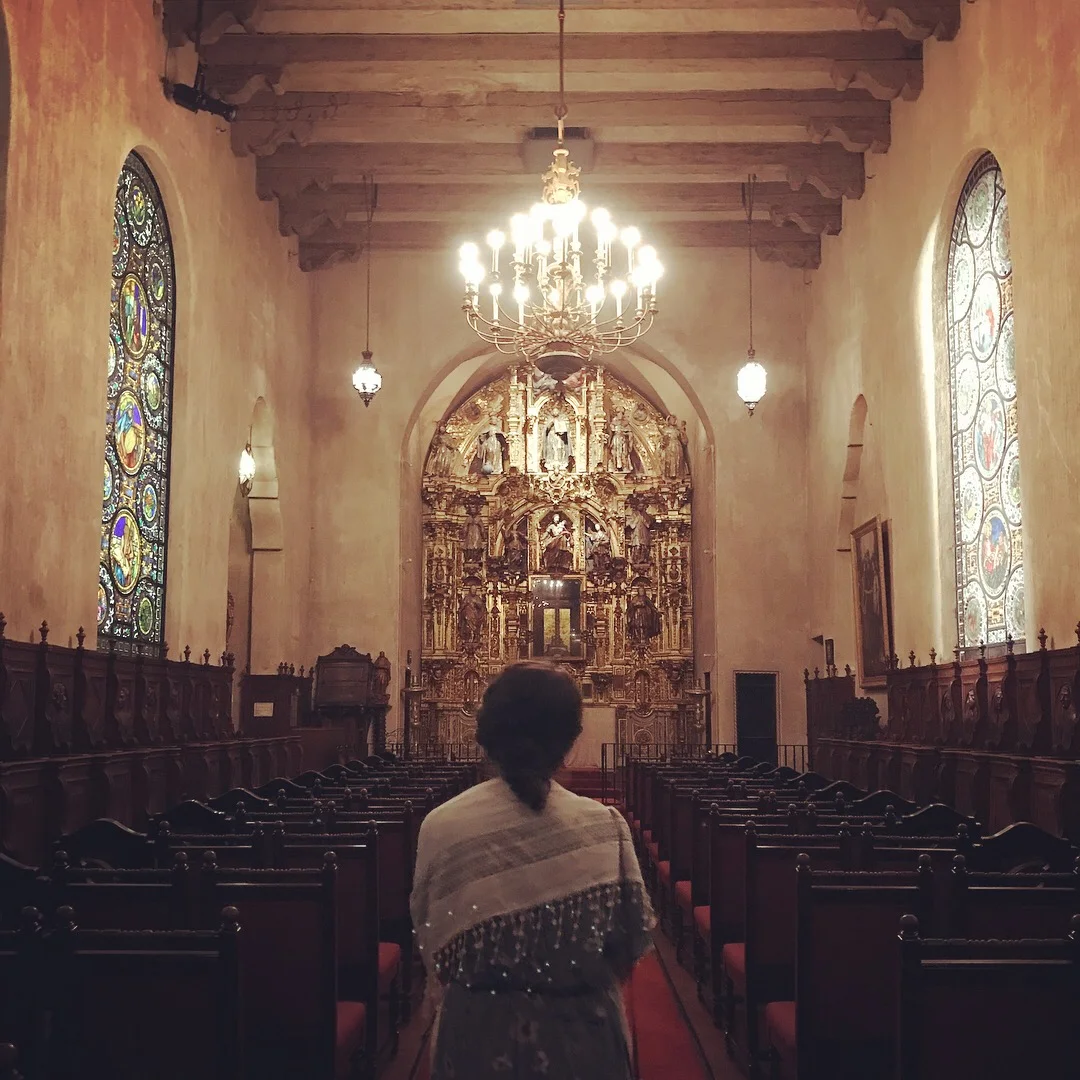There’s nothing glamorous about despair. Nothing pleasant about sitting in the wreckage of a poor decision or mourning the loss of a loved one. Not much pride in staining your best friend’s shoulder with mascara tears or devouring that carton of Rocky Road after a bad breakup.
There’s nothing glamorous about despair. But there’s something quite disarming – perhaps even cathartic – about encountering someone who can be truly honest about the rawness of their darkest moments. Someone who can take their own experiences of shame, betrayal, or loss and offer them to others in a way that invites connection and healing. Someone like Taylor Swift.
Whether you’ve attended one of her Eras Tour concerts, seen the movie, heard the playlists, or just been a human being on planet earth for the past year, you know that everybody and their mother – and their uncle and their cousin and their neighbor – has been talking about this tour.
This is the concert that broke Ticketmaster. During her show in Seattle, the energy and excitement of her fans sparked actual seismic activity equivalent to a 2.3-magnitude earthquake. World leaders in countries like Canada, Thailand, and Chile were requesting tour dates in their cities to boost their local economies. It’s more than a concert. It’s a landmark cultural and economic phenomenon – a defining event of our generation.
When a rare moment like this strikes – one where society as a whole seems to be uniting in fascination around a single person or event – I find it worthwhile for us as Christians to ask the simple question: why?
I won’t pretend to be the first person to ask this question. Last fall, New York Times Magazine published a cover story titled “My Delirious Trip to the Heart of Swiftiedom,” where Taylor is described as the one who “sings the song of all of us.” In The Daily podcast’s interview with the story’s author, the impact of Taylor’s music on her fans is described like this: “It makes them see anew a lot of the pain in their lives, to look it squarely in the face, and to try to better understand it and to have a catharsis around it.” She does this by bringing her own pain to bear with lyrics that both articulate and transcend her own experiences, leaving us with songs that have something in them for every one.
All Too Well, for instance, is a stunningly honest retrospective of a failed relationship. And yet, the words “I’d like to be my old self again but I’m still trying to find it” convey a timeless longing that most of us have felt at one moment or another. With the bridge of my tears ricochet, she gives us “I can go anywhere I want, anywhere I want, just not home” – her meditation on the yearning to return to simpler, more innocent times after being hurt. The chorus of marjorie offers a comforting refrain for remembering a lost loved one: “what died didn’t stay dead, you’re alive, you’re alive in my head.”
These are just a few of the lyrics that point to an overarching trend in Taylor Swift’s music. Instead of shoving despair under the rug, dismissing it with hollow platitudes, or drowning it in feigned optimism, her music creates a safehouse for all of it. A home where the heaviness of life is acknowledged for what it is – a universal experience – and a hopeful path forward feels within reach.
At this point, a believing Christian might be reading this and thinking “if that’s what people are looking for, they should just come to church!” After all, we preach the gospel of faith, hope and love. We worship a Savior who is able to “sympathize with our weakness… who in every respect has been tested as we are, yet without sin” (Hebrews 4:15). The One who Simon Peter turns to and says “Lord, to whom can we go? You have the words of eternal life” (John 6:68).
Yes. And here’s something that’s also true: we as the Church are often not great at holding space for despair.
On the surface, that might make sense. Despair is, by definition, the absence of hope. As bearers of the hope of Christ, our instinct is to lean into that hope, especially when hard times strike – and that’s a good thing. In fact, that’s one of the greatest gifts of having faith.
But hear this. That instinct to hurry ourselves and others through feelings like despair, grief, lament, doubt, and even anger toward God actually runs contrary to the witness of Scripture. For proof, look no further than the Book of Psalms.
A few weeks after The Eras Tour swept through my hometown, I started a seminary class entirely devoted to study of the Book of Psalms. In this class, we were encouraged to reflect on the psalms through the lens of the three-part paradigm found in Walter Brueggemann’s Spirituality of the Psalms.
Brueggemann breaks the psalms down into three main types: psalms of orientation, psalms of disorientation, and psalms of new orientation. Psalms of orientation are full of joy, gratitude, and praise to God. Psalms of disorientation are quite the opposite – marked by doubt, anger, bitterness, and sorrow. Finally, psalms of new orientation celebrate the transformation and new life found on the other side of suffering.
Mirroring the rhythms of everyday life, psalms across these three categories sit side by side. As the psalmists repeatedly move through each season – or dare-I-say era – of orientation, disorientation, and new orientation, they bring both their praises and their petitions to God with staggering honesty. The kind of honesty that, at times, makes you think “I don’t know if you can say that to God.” But you can. That’s the point.
In Psalm 88, a prayer of desperate pleading to the Lord, the suffering psalmist cries out “O Lord, why do you cast me off? Why do you hide your face from me” (Psalm 88:14). Later, “I suffer your terrors, I am desperate” (Psalm 88:15). Over a span of the mere six verses in Psalm 13, the question “how long?” is posed to the Lord four times. In the final verse of Psalm 137, the lamenting psalmist cries out against their oppressor, singing “Happy shall they be who take your little ones and dash them against rocks!” (Psalm 137:9).
These are not dignified, buttoned-up prayers. They’re the prayers of hurting people who are crawling to the feet of God with reckless abandon, their sorrow and humanity on full display. In Brueggemann’s words, these psalms “lead us into the presence of God where everything is not polite and civil.”
About half-way through my fall semester, I saw The Eras Tour Film in theaters. After months of marinating in the psalms — following this rhythm of orientation-disorientation-new orientation — I left the theater feeling like I had encountered something strangely familiar. Once I connected the dots, it was plain as day: the same paradigm we see in the Psalms is evident across the eras of Taylor Swift's music. Different content, different purpose, but the same underlying rhythms reverberate through both musical catalogs.
Here’s why that matters: the Eras Tour has shown us that this deeply biblical rhythm finds resonance in the hearts of literally millions of people. And yet, it’s one that many of us in the church so often neglect.
Until now, I was far less familiar with psalms of disorientation than psalms of orientation. In a challenging season, I’d be much more likely to gravitate toward an uplifting psalm that could raise my spirits or remind me of God’s faithfulness when I’m struggling to see it. That’s a good and holy impulse. What a gift it is to have such psalms available to us in our scriptures.
But if I’m honest, there’s more to it than that. That pull toward psalms of orientation also comes from the part of myself that has bought into the lie that escaping feelings of despair as quickly as possible is somehow “more Christian” than owning them, sitting in them, and working through them with God.
In Spirituality of the Psalms, Brueggemann speaks directly to the churchgoer who has believed this lie. To us, he writes, “We have thought that acknowledgment of negativity was somehow an act of unfaith, as though the very speech about it conceded too much about God’s ‘loss of control.’”
This is where psalms of disorientation come in. About the Church's tendency to gloss over them, Brueggemann writes “for the trusting community, their use is an act of bold faith, albeit a transformed faith… because it insists that the world must be experienced as it really is and not in some pretend way… it insists that all such experiences of disorder are a proper subject of discourse with God. Nothing is out of bounds, nothing precluded or inappropriate. Everything properly belongs in this conversation of the heart.”
While hard times naturally leave us all looking for the nearest exit sign, the reality is that true hope – the abiding and steadying kind that we find in Christ alone – often comes while we’re wading through the drudgery of our worst days. The Psalms invite us into acceptance of something we already know in our bones: God hears, speaks to, and abides with us through every season. Even the ugly ones. Especially the ugly ones.
The very names by which we call out to God in times of despair – my Healer, my Redeemer, my Comforter – demand that we acknowledge our acute need for God in seasons of disorientation. And that acknowledgment demands that the Church be a place where disoriented people, bearing the crushing weight of their deepest hurts and yearnings, can lay it all at the throne of God and find peace.
“The Psalms issue a mighty protest and invite us into a more honest facing of the darkness,” writes Brueggemann. The same could be said of Taylor Swift. But Brueggemann continues: “The reason the darkness may be faced and lived in is that even in the darkness, there is One to address.”
In those moments – the ones when the light at the end of the tunnel is a little too faint to see – our faith in Christ is the lantern that guides our tired feet through the dark. The hope we find on the other side of that darkness is different than the hope we had before. It’s been transformed. We have been transformed.
“The psalms regularly bear witness to the surprising gift of new life just when none had been expected,” writes Brueggemann. “That new orientation is not a return to the old stable orientation, for there is no going back. The psalmists know that they can never go home again.”
And so, even for Brueggemann – even for the psalmists – it seems the lyrics of that my tears ricochet bridge ring true: “I can go anywhere I want, anywhere I want, just not home.”
Without even trying, the eras of Taylor Swift’s music point us back to an age-old tradition of our faith – one that the Book of Psalms will not let us forget. A tradition of engaging both joy and sorrow before the throne of God with vulnerability and honesty. One of allowing thankfulness, lament, faith, doubt, praise, anger, and hope to exist alongside one another in all of their messiness as we seek to know, serve, and love God more fully.
May we as the Church reclaim that tradition and begin a new era of faithfulness to it.
An adapted version of this article was published by Common Good Magazine.





